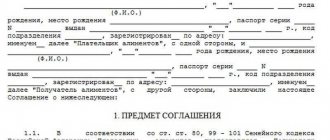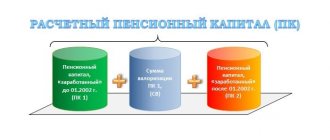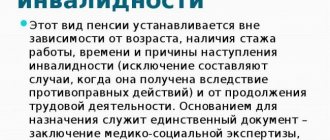- home
- Reference
- Labor pension
Due to the difficult economic situation in which our country finds itself, the level of income and, accordingly, the material security of the population is falling. Among other things, this is reflected in the fact that the debt load of citizens is growing, and with it the indicator of overdue debt.
Current legislation establishes various mechanisms for its collection. Among them, the most effective is to withhold part of the funds from the citizen’s income. As a rule, in this case we are talking about wages. At the same time, deductions from various types of social payments are not allowed. In this regard, many pensioners have a question regarding the possibility of forced deduction from pensions under a writ of execution. The answer to this is contained in the article below.
Is recovery possible?
In recent years, pensioners have increasingly become clients of banks and other financial institutions. It should be noted that if previously credit institutions often refused loans to older people, now the line of banking products includes separate programs for lending to them.
Pensions in Russia are relatively small, so their recipients may also not be able to service their debt. Late payment on a loan may result in fines and penalties, which leads to an increase in the amount of debt and a complete inability to fulfill one’s obligations. In this case , banks turn to the courts, on the basis of whose decisions bailiffs initiate enforcement proceedings , within the framework of which they carry out forced collection of funds.
The income from which recovery can be carried out includes pension payments, however, with a certain reservation, which will be discussed below.
Attention! The full list of income from which collection is not allowed is established by Article 101 of the Federal Law “On Enforcement Proceedings”.
Thus, part of the pension payments may be subject to collection.
about deductions from pensions
Dear comrades. I am interested in what percentage of the pension amount is withdrawn from a working pensioner. The fact is that I have a coefficient of 1.214 upon retirement, because... I worked as a nurse in a surgical hospital in the mountains. Minsk. She retired due to length of service, and after that she worked at the clinic as a head nurse for three years. Now I’m working again after a three-month break in the hospital. All this time, a certain amount was withheld from my pension as from a working pensioner. I recently learned that those whose pensions are calculated with a coefficient greater than 1.3 must withhold. Is there a regulatory act regulating this procedure for withholding amounts from pensioners from pensioners? If so, what percentage of the pension amount is withdrawn from a working pensioner and how to return deductions from the pension if they were carried out in violation of the law. Best regards, Svetlana.
LAW OF THE REPUBLIC OF BELARUS April 17, 1992 N 1596-XII
ABOUT PENSION SECURITY Article 83. The procedure for paying pensions Pensions are paid by district (city) departments (departments) for labor, employment and social protection without taking into account the earnings (income) received at the place of actual residence of the pensioner. At the same time, the part of the pension calculated taking into account earnings over 130 percent of the average wage of workers in the republic, used to adjust the actual earnings of a pensioner (Articles 56 and 70 of this Law), during the period of work (service) or entrepreneurial activity (except for work directly in production agricultural products on collective farms, state farms and other agricultural enterprises) is not paid. Age pensions assigned in accordance with the Law of the Republic of Belarus “On Employment of the Population of the Republic of Belarus” are not paid during the period of work. After acquiring the right to an old-age pension on other grounds, the pension is paid in accordance with part one of this article. Pensions for long service are not paid during the period of work giving the right to this pension. Payment of pensions is made at the choice of pensioners through postal organizations, banks, organizations carrying out activities for the delivery of pensions. The delivery and forwarding of pensions is carried out at the expense of the funds from which their payment is financed. In case of non-receipt of a pension through the specified organizations, except banks, for six months in a row, the payment of the pension is suspended from the 1st day of the month following the month in which the six-month period expired. Resumption of pension payment is carried out in accordance with Article 82 and taking into account Article 90 of this Law. Amounts of pensions transferred to banks after the occurrence of circumstances leading to the termination of payment of pensions (death of a pensioner, departure for permanent residence abroad, etc.) are subject to return to district (city) departments (departments) for labor, employment and social protection on the basis of their orders. If at the time the order is received by the bank, pension amounts have been issued, then their collection is carried out in the manner established by the legislation of the Republic of Belarus.
Article 56. Calculation of pensions as a percentage of earnings Pensions are calculated according to established standards as a percentage of the actual earnings adjusted due to the increase in the average wage of workers in the republic (Articles 57, 58 and 70 of this Law), which citizens received before applying for a pension. In this case, earnings not exceeding 130 percent of the average wage of workers in the republic, used to adjust the actual earnings of a pensioner (Article 70 of this Law), within 10 percent of the specified value are taken into account in full, and within each subsequent 10 percent - respectively in the amount of 90, 80 , 70, 60, 50, 40, 30, 20 and 10 percent. Earnings in the range from 130 to 400 percent of the average wage of workers in the republic, used to adjust the actual earnings of a pensioner, are taken into account in the amount of 10 percent. For persons engaged in underground work and surface work related to underground work (paragraphs one, two and three of paragraph “a” of part one of Article 12 and part one of Article 15 (list No. 1) of this Law), this earnings are taken into account in the amount 20 percent, and for persons employed for a long time in underground and open-pit mining (Article 13 of this Law) - in the amount of 30 percent. The amount received in this way is considered earnings from which the pension is calculated.
Article 70. Recalculation of pensions in connection with an increase in average wages In connection with the increase in the average wage of workers in the republic, the actual earnings of a pensioner are adjusted for the corresponding recalculation of pensions, as well as an increase in pensions calculated in the minimum amount. Recalculation of pensions in connection with the increase in the average wage of workers in the republic is carried out if its growth in the past quarter compared to the average wage of workers in the republic, applied in the previous recalculation of pensions, amounted to more than 15 percent. Recalculation is made on the basis of the average wages of workers in the republic for the corresponding quarter after the month following this quarter. If during the calendar year there are no grounds for recalculating pensions in accordance with part two of this article, from November 1 pensions are recalculated without fail on the basis of the average wages of workers in the republic for the third quarter. An increase in pensions calculated in the minimum amount is carried out regardless of the supplements to pensions and their increases provided for by current legislation. The procedure for recalculating pensions and increasing pensions calculated in the minimum amount in accordance with this article are determined by the Council of Ministers of the Republic of Belarus.
Pension legislation provides for a partial limitation on the payment of pensions during the period of work or entrepreneurial activity. According to part one of Article 83 of the Law of the Republic of Belarus 04/17/1992 N 1596-XII “On pension provision”, during the period of work or engaging in entrepreneurial activity (with the exception of work directly in the production of agricultural products on collective farms, state farms and other agricultural enterprises), the pensioner is not paid a portion pensions, calculated taking into account earnings over 130 percent of the average wage of workers in the republic, used to adjust the actual earnings of the pensioner. That is, the specified limitation on the payment of part of the pension during the working period concerns relatively high pension amounts. The individual earnings coefficient of most pensioners does not exceed 1.3, and their pension is paid in full, regardless of the fact of work and earnings received. Working pensioners who have an individual earnings ratio of over 1.3 are paid a pension during their work period, calculated taking into account the individual earnings ratio of 1.3.
Article 79. Procedure for appealing decisions of the body that assigns and recalculates pensions. The decision of the body that assigns and recalculates pensions can be appealed to a higher body for labor, employment and social protection. If the person who applied for the assignment or recalculation of a pension, the employer and other interested parties do not agree with the decision made by this body, the dispute is resolved in court. Article 90. Payment of pensions for the past. Accrued pension amounts that are not claimed by the pensioner in a timely manner are paid for the past no more than 3 years before applying for a pension. Pension amounts not received on time due to the fault of the body assigning or paying the pension are paid for the past without any time limit.
This is interesting: How many pension points are needed to receive a pension?
In what cases is it permissible to withhold funds?
Most often, debts arise due to failure to fulfill financial obligations to credit institutions and individuals.
However, the reasons for deductions from pensions are not limited to this. So, debts can arise:
- due to failure to pay utility bills;
- if there are delays in paying taxes and other obligatory payments;
- when imposing fines.
The debtor may not always guess that he has a debt. In order to be able to repay it in a timely manner, without waiting for deduction from the pension, it is recommended to check the presence of debts in the database of enforcement proceedings on the website of the FSSP of Russia.
In addition, there are often cases when the Russian Pension Fund accrues money to a pensioner in excess of what he is entitled to. In this situation, the Pension Fund has the right to return overpaid funds by making deductions from pension payments.
Reference! It should be noted that there are several types of pensions. Thus, deductions from insurance, social, and disability pensions are allowed. However, even if there are debts, it is impossible to collect from the survivor's pension payment. This applies to both its federal part and various supplements to it paid from regional budgets.
How much can I charge?
Pensions, being the only source of income for most older people, cannot be used to pay off the entire debt. However, often even a simple deduction from payments leads to the fact that the pensioner is left with an amount that can be significantly less than the subsistence level.
This situation is unacceptable, since it directly contradicts the norms of the Civil Procedure Code and the Federal Law “On Enforcement Proceedings”. Thus , collection can be carried out only taking into account that after it the debtor remains with an amount the amount of which is more than the subsistence level for a pensioner established in a specific subject of the Federation.
In practice, bailiffs foreclose on pensions, regardless of these restrictions on whether the pensioner is working or not. To correct this situation, the pensioner needs to file a complaint against the actions of the bailiff to the court or to a higher official.
If the pensioner has other sources of income, then they are also taken into account when determining the amount of the remaining funds after deduction from the pension.
Amount of deductions from pension contributions
How much bailiffs and the Pension Fund can deduct from pensions is regulated by the Law “On Insurance Pensions” (400-FZ). More than 50% of monthly pension payments cannot be withheld from the debtor. In this case, the amount remaining after deducting 50% should not be lower than the subsistence level for a pensioner established in the city of registration of the debtor. That is, if the cost of living in the city is 11,830 rubles, and the pension is 19,830 rubles, then, even if the court ordered a 50% withholding, the bailiffs will legally be able to withhold only 8,000 rubles from these amounts.
In exceptional cases, the court may order deductions from pensions by bailiffs in the amount of 70%. This percentage is established when a large amount of debt accumulates, as well as when a debt is formed to pay child support for minor children.
In case of withholding of debts based on a decision of the pension authority, the amount of such withholdings cannot exceed 20% monthly.
What is the limit on deduction for debt? And what cannot be recovered by law?
From salary, pension or other income, the bailiff can withhold a maximum of 50% of all writs of execution. And if the debt is for alimony or damages due to a crime, then up to 70%.
But regardless of the type of debt, you cannot foreclose on:
- the only housing other than a mortgage;
- clothing, shoes and household items, except jewelry;
- things that are needed for work, except for very expensive ones;
- Food;
- livestock and seeds (expensive dogs and premium feed do not count);
- a car for a disabled person;
- prizes and awards;
- money in cash and in accounts in the amount of the subsistence level for the debtor and his dependents.
When calculating the amount of collection, the bailiff is obliged to take into account the financial situation of the debtor. Bailiffs can also illegally write off money from accounts that receive alimony, benefits or compensation. This is prohibited and must be challenged.
Features of debt payments by disabled people
The decision on how much and according to what schedule a person with physical disabilities should repay the debt is made by the court.
The following factors are taken into account:
- disability group>;
- degree of ability to work;
- availability of a place of duty.
Attention: the court is obliged to take into account the difficulties faced by a disabled citizen.
However, the latter must justify the impossibility of repaying financial obligations. Based on the documents and testimony provided by the defendant-debtor, the court has the right to:
- reduce the amount to be paid;
- establish a gentle payment schedule;
- completely release the defendant from repaying the debt.
For information: as a rule, disabled people of group 1 who spend the entire allowance on purchasing medicines to maintain the vital functions of the body are exempt from payments.
Amount of penalty
The amount of deduction from pension payments is strictly limited by current legislation. So, it cannot exceed half its size. However, 50% is the maximum withholding amount. In practice, due to specific circumstances, it can be significantly reduced.
Important! In some cases, foreclosure is allowed at 70% of the pension payment. This is possible in exceptional cases, for example, when paying compensation to victims of unlawful actions of a pensioner.
Separately, the law establishes the maximum amount of withholding for overpaid amounts to the Pension Fund. It cannot be more than 20%.
Is it possible to reduce the amount
Due to various circumstances, a 50% penalty can lead a pensioner to extreme financial difficulty. In these cases, the law establishes certain relaxations in terms of debt collection.
- Postponement. Deferment means a temporary cessation of enforcement actions. The reasons for granting a deferment must be compelling, for example, serious illness and the need for expensive treatment. If the grounds for deferment no longer exist, enforcement actions are resumed.
- Installment plan. By installments we mean a reduction in the amount of deduction. The grounds for its provision must be compelling, for example, a significant deterioration in financial situation.
To achieve a deferment or installment plan, the debtor must go to court, providing maximum evidence of his difficult situation.
The order of repayment of debts through deductions from pensions
If a pension recipient has received several enforcement demands, and state payments are not enough to cover them, deductions are made in the following order:
- Priority is given to alimony, compensation for damage to health and compensation for damage to dependents in connection with the death of the breadwinner.
- The second most important are budget payments.
- Other requests are satisfied in the order they are received.
The claims of each subsequent queue are satisfied only after the claims of the previous queues have been fully settled. If the maximum deductible amount is not sufficient to pay multiple equal claims, they will be paid pro rata in equal shares.
This month the following part of the first priority obligations will be repaid:
- alimony: 4,500 × 86.9% = 3,910.5 rubles;
- compensation for health damage: 10,000 × 86.9% = 8,690 rubles.
Next month you need to pay off:
- monthly alimony payment is 4,500 rubles, the debt from the previous month is 4,500 - 3,910.5 = 589.50 rubles.
- balance of debt for health damage 10,000 - 8,690 = 1,310 rubles.
If, after all the deductions made, an amount remaining for payment is less than the subsistence level, the pensioner has the right to apply to the court to reduce the amount of deductions.
This is interesting: Working pensioners will have their pension canceled
How to remove restrictions after payment
As a rule, after the debt is paid, enforcement proceedings are terminated and no further deductions are made. However, in practice, citizens often find themselves in a situation where, even after repaying the debt, the pension still does not arrive in full, and the accounts remain under arrest.
In this regard, immediately after repaying the debt, the pensioner must contact his bailiff directly. As part of a personal meeting, he should obtain from him a copy of the decision to terminate enforcement proceedings. With this document, the pensioner applies to the pension fund and other institutions. Based on the resolution, all existing restrictions will be canceled and encumbrances will be lifted.










